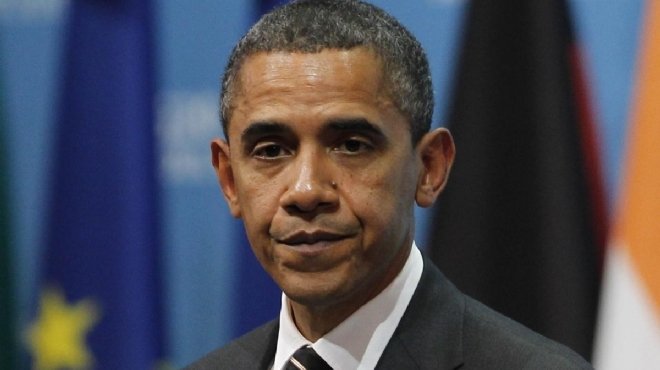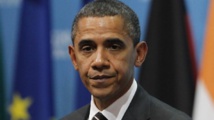Obama also said that Washington did not need to choose to side with Syrian President Bashar al-Assad to combat the Islamic State, which exploited a power vacuum in the middle of Syria's vicious turmoil and last week brutally executed US journalist James Foley.
"We don't have a strategy yet," Obama said, before huddling with his top national security advisors in the White House Situation Room to plot how to respond to IS.
"I think what I've seen in some of the news reports suggests that folks are getting a little further ahead of where we are at than we currently are."
Obama's remarks ignited an immediate political firestorm with Republicans expressing disbelief that he did not have a strategy to fight a radical Sunni group some of his top officials have described as a grave threat to the United States.
In a swift damage control effort, White House aides stressed the president was referring solely to plans to attack IS in Syria, and argued he had already laid out a clear strategy to respond to the group in Iraq and elsewhere.
The president also announced he would dispatch Secretary of State John Kerry to the Middle East to begin building a comprehensive regional anti-IS effort with partners in the region, especially among those who adhere to the Sunni branch of Islam.
Obama, who authorized air strikes on the IS in Iraq, said there would be a military component to targeting the jihadists, but said that force could only halt their advance in the short term and that their permanent eradication depended on regional political and diplomatic action.
"It's going to require us to stabilize Syria in some fashion, (that) means we (have) got to get moderate Sunnis who are able to govern."
- 'Cart before horse' -
Obama also argued that the incoming government in Baghdad, which Washington hopes will be less sectarian than that of outgoing Prime Minister Nuri al-Maliki, will be vital to reversing rapid IS gains in Iraq and neighboring Syria.
He addressed calls in some sectors of the US foreign policy community for Washington to swallow hard and agree to work alongside Assad's regime as the lesser of two evils compared to IS.
"I don't think there's a situation where we have to choose between Assad or the kinds of people who carry on the incredible violence that we've been seeing there," he said.
Obama said Assad had lost legitimacy through acts such as dropping barrel bombs on innocent families and killing tens of thousands of people, and argued Assad forces did not even have the capability to reach into areas where IS was dominant.
The US president also declined to commit to asking Congress for authorization to expand US air strikes currently taking place in Iraq against IS to Syria, though promised to consult lawmakers on any action he takes.
A year ago, Obama abandoned plans to strike Syria after accusing Assad of violating a US "red line" by using chemical weapons, after it became clear lawmakers did not support the action.
"I don't want to put the cart before the horse," Obama said.
"There's no point in me asking for action on the part of Congress before I know exactly what it is that is going to be required for us to get the job done."
- Damage Control -
But Obama's admission that his government did not so far have a strategy to take on IS in Syria, grabbed most attention from his White House news conference.
Aides rushed to clarify his remarks as Obama's quote exploded on social media and prompted Republicans to pounce.
Obama spokesman Josh Earnest told CNN that when he said he had no strategy, Obama was referring to the fact he was waiting for a plan for Syria strikes from the Pentagon.
But Republicans, who brand Obama as disengaged and his foreign policy feckless, were not appeased.
"It just confirmed what we've been talking about really for almost two years, there has been no real strategy," said Mike Rogers, chairman of the House Intelligence Committee.
"To have a press conference to say we don't have a strategy was really shocking, given the severity of the threat."
Republican Representative Louie Gohmert said: "He has never had a good strategy."
Expectations of robust US military action have multiplied since the video emerged of Foley's killing last week.
There have also been sharp warnings -- even from members of Obama's own administration -- of US vengeance and the potential threat to the United States and its allies from potential IS terror attacks.
----------------------------------------------------------------------------------------------------
"We don't have a strategy yet," Obama said, before huddling with his top national security advisors in the White House Situation Room to plot how to respond to IS.
"I think what I've seen in some of the news reports suggests that folks are getting a little further ahead of where we are at than we currently are."
Obama's remarks ignited an immediate political firestorm with Republicans expressing disbelief that he did not have a strategy to fight a radical Sunni group some of his top officials have described as a grave threat to the United States.
In a swift damage control effort, White House aides stressed the president was referring solely to plans to attack IS in Syria, and argued he had already laid out a clear strategy to respond to the group in Iraq and elsewhere.
The president also announced he would dispatch Secretary of State John Kerry to the Middle East to begin building a comprehensive regional anti-IS effort with partners in the region, especially among those who adhere to the Sunni branch of Islam.
Obama, who authorized air strikes on the IS in Iraq, said there would be a military component to targeting the jihadists, but said that force could only halt their advance in the short term and that their permanent eradication depended on regional political and diplomatic action.
"It's going to require us to stabilize Syria in some fashion, (that) means we (have) got to get moderate Sunnis who are able to govern."
- 'Cart before horse' -
Obama also argued that the incoming government in Baghdad, which Washington hopes will be less sectarian than that of outgoing Prime Minister Nuri al-Maliki, will be vital to reversing rapid IS gains in Iraq and neighboring Syria.
He addressed calls in some sectors of the US foreign policy community for Washington to swallow hard and agree to work alongside Assad's regime as the lesser of two evils compared to IS.
"I don't think there's a situation where we have to choose between Assad or the kinds of people who carry on the incredible violence that we've been seeing there," he said.
Obama said Assad had lost legitimacy through acts such as dropping barrel bombs on innocent families and killing tens of thousands of people, and argued Assad forces did not even have the capability to reach into areas where IS was dominant.
The US president also declined to commit to asking Congress for authorization to expand US air strikes currently taking place in Iraq against IS to Syria, though promised to consult lawmakers on any action he takes.
A year ago, Obama abandoned plans to strike Syria after accusing Assad of violating a US "red line" by using chemical weapons, after it became clear lawmakers did not support the action.
"I don't want to put the cart before the horse," Obama said.
"There's no point in me asking for action on the part of Congress before I know exactly what it is that is going to be required for us to get the job done."
- Damage Control -
But Obama's admission that his government did not so far have a strategy to take on IS in Syria, grabbed most attention from his White House news conference.
Aides rushed to clarify his remarks as Obama's quote exploded on social media and prompted Republicans to pounce.
Obama spokesman Josh Earnest told CNN that when he said he had no strategy, Obama was referring to the fact he was waiting for a plan for Syria strikes from the Pentagon.
But Republicans, who brand Obama as disengaged and his foreign policy feckless, were not appeased.
"It just confirmed what we've been talking about really for almost two years, there has been no real strategy," said Mike Rogers, chairman of the House Intelligence Committee.
"To have a press conference to say we don't have a strategy was really shocking, given the severity of the threat."
Republican Representative Louie Gohmert said: "He has never had a good strategy."
Expectations of robust US military action have multiplied since the video emerged of Foley's killing last week.
There have also been sharp warnings -- even from members of Obama's own administration -- of US vengeance and the potential threat to the United States and its allies from potential IS terror attacks.
----------------------------------------------------------------------------------------------------









 Home
Home Politics
Politics











